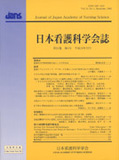Japanese
English
- 販売していません
- Abstract 文献概要
- 参考文献 Reference
要旨
本研究は,子どもを亡くした父親がどのような悲嘆を体験し,かつどのように子どもの死を受け入れ自己を変化させていくのか,その悲嘆過程を明らかにすることを目的とした.小児がんで子どもを亡くし,死別後3年から10年を経た父親5名を対象に悲嘆過程に関する半構成面接を実施し,質的帰納的に分析した.
分析の結果,【死別の悲しみ】,【子どもを亡くした悲しみとの対峙】,【子どもの死を認める作業】,【子どもの死の受容】,【価値観の変容】,【悲しみの受け止め方の変容】,【子どもとの絆の維持】という7つのカテゴリーが抽出された.
本研究で確認された父親の悲嘆の特徴は,子どもの死は父親にとっても深い悲しみであり,母親とは異なる質の罪責感や後悔を体験していたこと,父親の悲嘆過程において仕事が重要な役割を果たしていたこと,父親の多くは悲嘆過程の中で泣くことを体験しており,必ずしも男性の役割期待が感情表現を妨げるとは限らないことなどであった.
Abstract
The purpose of the study was to explore the grief process of fathers who lost a child to cancer; how they experienced grief, accepted their child's death and changed themselves in the process.
Subjects were five fathers, aged 39-49. The time since the child's death was between 3years and 10 years. Data was collected by semi-structured interviews and analyzed using an inductive qualitative method.
Seven categories were identified. ① Sorrow. ② Confrontation of longing for the lost child. ③ Need to accept the reality of the child's death.④ Acceptance of the child's death.⑤ Transfiguration of values.⑥ Transfiguration of the meaning of the sorrow.⑦ Keeping a bond with the child.
Fathers grieved deeply and they experienced guilt and regret. However, the quality of these feeling was different from mother's guilt feelings. Work has a special role for father's grief process. In this study fathers were able to cry and express the full range of their sorrow and loss. This finding demonstrated that fathers who lose a child do not necessarily experience stunted affective expression of their grief due to their role expectations.
Copyright © 2004, Japan Academy of Nursing Science. All rights reserved.


